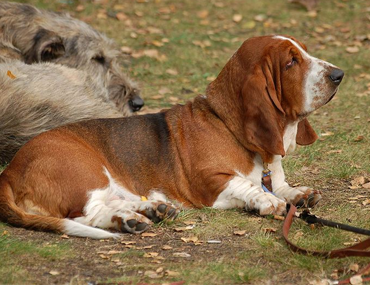Background:
The modern basset hound is credited to St. Hubert of Belgium, who bred his dogs at the Benedictine Abby In 1000 AD. They were known as St Hubert hounds at the time and eventually renamed “basset,” after the French word meaning “low.” Among St. Hubert’s litters were both bloodhounds and basset hounds.
The basset hounds were described as “slow, short-legged dogs with deep mouths.” It has been speculated that basset hounds were originally breed from genetic dwarf like dogs who were born in other litters of hunting dog.
The basset hound was a favorite in France and England for centuries, valued for its ability to hunt small game. The basset hound was one of the few slow hunting dogs. This allowed for hunters on foot to catch up with their game before the dog scared it away.
In Europe during the late 1800’s arguments began about whether the basset hound should be used as a show dog or kept as a hunting dog. America solved the problem by breeding basset hounds with both show and hunting traits.
It’s said that both George Washington and Napoleon Bonaparte owned basset hounds.
Sizing up:
- Weight: 50 to 65 lbs

- Height: No breed standard
- Coat: Short, smooth, soft
- Color: Black, tan or white.
- Life expectancy: 12- 15 years
What’s the basset hound like?
The basset has a reputation for being stubborn. In actuality he’s very easy to train but responds only to positive reinforcement and never to negative. The basset is a food hound and will do anything you ask so long as the reward is tasty enough.
The basset hound is good natured and easy going. His laid back personality makes him a great dog for children. He’s intelligent and can’t help manipulating strangers with his adorable looks.
The basset is a scent dog. Meaning he’ll chase anything he can sniff out. You want to take extra care to keep him out of the street.
The basset is bold and confident and you should be too when it comes time to train.
The basset hound needs to be properly socialized which should be fun for him because he’s a pack animal. He’ll do well around other pets but on occasion does require his own space.
Health:
There are several conditions that might hit the basset hound more often than other breeds:
- Von Willebrand’s disease
- Hyperthyroidism
- Glaucoma
- Thrombopathia
- Patellar luxation
- Elbow dysplasia
- Combined immunodeficiency
Takeaway points:
- The basset hound is a pack animal
- The basset hound will always follow his nose first
- The best way to train a basset hound is with food
If you have any questions or concerns, you should always visit or call your veterinarian – they are your best resource to ensure the health and well-being of your pets.
![]()

